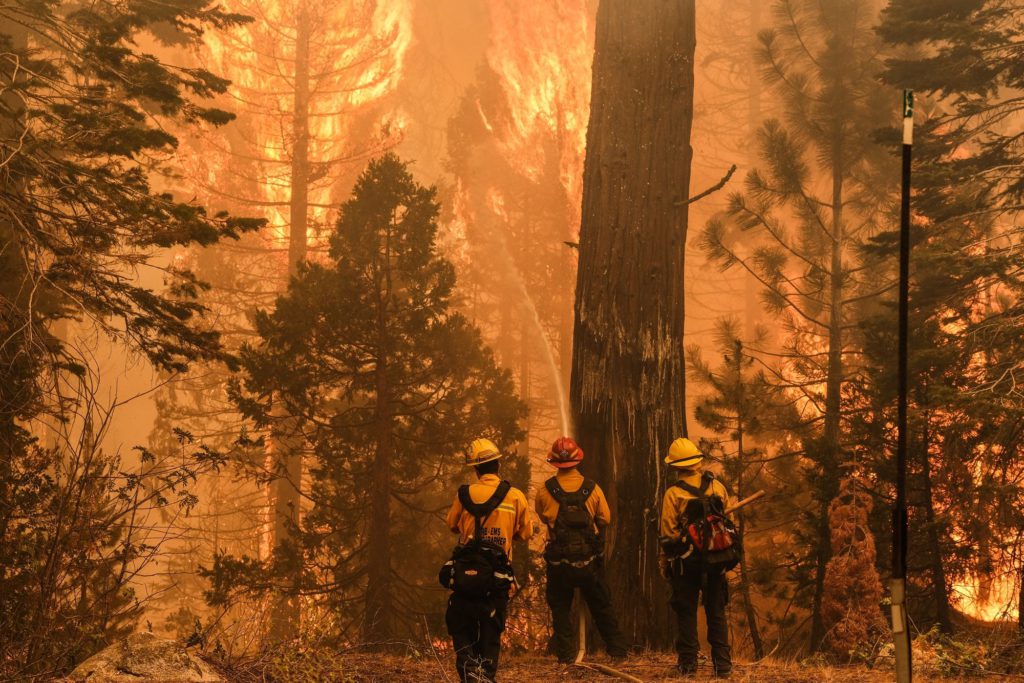(Bloomberg) — The sparkling shores of Lake Tahoe were an escape for throngs of remote workers during the Covid-19 pandemic. Now, another disaster has caught up with them.
The Caldor Fire ripping through the mountainous region of Northern California has engulfed much of the area in smoke and ash since mid-August. This week, it forced the evacuation of the 22,000 residents of South Lake Tahoe, the economic heart of the vacation destination and home to many of its rental houses and hotels.
It’s also one of the towns where real estate demand exploded during Covid lockdowns, sending home prices up more than 40% as people flocked to Lake Tahoe’s pristine scenery, beaches and hiking trails. The crowd of newcomers, many of them technology workers from the pricey San Francisco Bay area, are now finding their one-time haven colliding with California’s climate-change reality.
Bradley Herman, the chief technology officer of a transportation startup, moved to South Lake Tahoe from San Francisco in June 2020. In recent weeks, he found himself wiping ash off the rental house he shares with his wife. The lunch-hour paddleboarding trips that had once been the envy of his far-flung colleagues became unbearable as the air quality reached hazardous levels.
Herman had an easier evacuation path than most: He’d already been traveling with his wife, Alyona Timkina, following the jam band Phish. When the winds shifted last week, they picked up their car and dog and drove to Silicon Valley’s Mountain View — where a Phish concert that had been scheduled for the Tahoe area had also relocated, due to the blaze.
“We may not be able to return to our homes for two, three, four weeks — assuming that we have a home, in the best-case scenario,” Herman said.
The influx of remote workers into Lake Tahoe, already often crowded with tourists and weekenders from the Bay Area, crammed vacation rentals and co-working spots, sometimes leading to tensions with locals. The median sale price of a single-family home in the South Lake Tahoe area reached $679,000 last month, up 32% from a year earlier and 44% from March 2020, according to the local Realtors association. All-cash offers and bidding wars are common.
For long-term residents and workers who’ve already been squeezed by the affluent newcomers, losing a Tahoe home could mean losing everything. For the newcomers, the disaster is still devastating — but it could also be a push to head back to the cities they came from.
“If you would have called me last week before all this happened, I’d say prices are still hanging in there, inching up,” said Ginger Nicolay-Davis, a real estate agent with Compass who is sheltering evacuees in her Tahoe Valley home. “It’s interesting to see what will happen after this, if it’s going to scare people away, or if people will stay the course.”
As of Thursday, the threat of the Caldor Fire to South Lake Tahoe had somewhat eased as high winds died down. Still, the blaze has stretched to more than 210,000 acres and is responsible for destroying at least 500 homes. The smoke could permanently change the underwater ecosystem — and in the short-term, the color and clarity — of Lake Tahoe. State parks are currently closed, and even as the flames are beaten back from neighborhoods by firefighters, many of the parks and trails have been damaged.
Oscar Wei, the deputy chief economist for the California Association of Realtors, expects housing demand will immediately slow before eventually rebounding, as it has in other disaster-stricken parts of the state. The area around Paradise, the town destroyed in 2018’s Camp Fire, is being rebuilt.
“A year later, two years later, you will probably see builders start building back homes in the area, and then slowly, you’ll start seeing demand going back,” Wei said.
Marika de Bruijn grew up in South Lake Tahoe, and after 13 years at Google and a move to Switzerland, she found herself back there last year. She and her family had settled down in the Bay Area town of San Carlos in 2014, and bought a vacation home in the resort town three years ago. During last year’s lockdown, they rented out their San Carlos house and hunkered down at the lake full time, signing into school and work remotely.
When the fire started approaching, they fled to her mother’s house across the border in Nevada, until the air quality there got too unbearable. They packed up once again and went back to San Carlos, staying in an unoccupied home of a friend and anxiously scanning Nextdoor posts about the fire. She’s grateful for the way her friends stepped in to help.
“I don’t think it’s going to devastate the way we look at or feel about Tahoe,” de Bruijn said. “During times of crisis, I think you realize it’s not so much where you live, but who you have around you.”
More stories like this are available on bloomberg.com
©2021 Bloomberg L.P.











